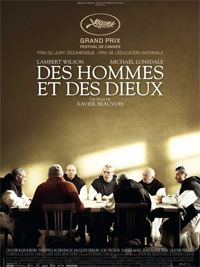 Even for someone who doesn’t know about monasteries, Christianity, Islam, or Algeria, I think this movie is a very powerful and convincing movie. Viewers feel there is more than just religion and politics in this movie.
Even for someone who doesn’t know about monasteries, Christianity, Islam, or Algeria, I think this movie is a very powerful and convincing movie. Viewers feel there is more than just religion and politics in this movie.
In the rustic Catholic Notre-Dame de l’Atlas monastery in Algeria, eight French monks and doctors live as an important part of the surrounding community. However, the actions of Islamic extremists begin to affect the nearby area, and a Croatian is murdered in a wasteland less than 20 kilometers away from the monastery. The monastery is drawn into a dispute between Algerian government troops and extremists when several armed extremists break into the monastery on Christmas Eve and demand medical treatment for their injured. When the French government requests that the monks return to France, the monks debate over returning for their own safety, or staying and risk becoming martyrs.
These monks abandoned their assets and decided to leave their families in order to help people in the area and impart the teachings of God. Do those who have abandoned an ordinary life to serve God still wish to avoid death? Naturally, as humans, they have a fear of death. However, since they are giving their own lives to God, they believe they should not waste their lives and should serve God as long as they can. Therefore, remaining here while knowing danger approaches could be a waste of the life God gave them.
On the other hand, some monks think of this Algerian village as their own hometown and are determined to die there. Also, some think that they have not yet accomplished God’s mission given to them and feel they can’t leave yet. Others are unable to decide with conviction so they pray to God to hear God’s voice. However, they do not get an answer from God.
 Even though the monks are divided on the question of whether to stay or retreat, no one intends to have the government army troops protect them. God’s voice is the basis for their decisions, and thus they don’t makes decisions based on the politics of either the government troops or the extremists who are killing each other. In the end, the question to be answered is, “When the wolf attacks, does a shepherd desert the sheep and run away?” Even though the villagers are Muslim, the villagers rely on the monks and are thankful for the services they provide. Therefore, the monks are able to gain the conviction that, whatever may happen, their service here was not futile and they are determined to die here in the village. This movie is based on a true story of monks that were executed by decapitation in Algeria in 1996.
Even though the monks are divided on the question of whether to stay or retreat, no one intends to have the government army troops protect them. God’s voice is the basis for their decisions, and thus they don’t makes decisions based on the politics of either the government troops or the extremists who are killing each other. In the end, the question to be answered is, “When the wolf attacks, does a shepherd desert the sheep and run away?” Even though the villagers are Muslim, the villagers rely on the monks and are thankful for the services they provide. Therefore, the monks are able to gain the conviction that, whatever may happen, their service here was not futile and they are determined to die here in the village. This movie is based on a true story of monks that were executed by decapitation in Algeria in 1996.
North African French colonies Tunisia and Morocco declared their independence in 1956. However, unlike these two countries where the organization of the monarchy was preserved as French protectorates, Algeria was treated as a part of France and there were many Europeans living in Algeria; therefore the public opinion of France voiced strong opposition to the independence of Algeria and the French government did not allow independence. Algerians of European descent wanted to maintain their privileges as Europeans and kept refusing to cooperate with the Berbers and Arabs living in Algeria; therefore the development of a cross-ethnic, moderate independence movement toward a unified nation failed. Algeria underwent the violent Algerian War from 1954 to 1962 before gaining their independence from France and due to this, one million Algerians of European descent escaped to France en masse. The Muslim Algerians who cooperated with France and were not able to take refuge in France were massacred as retribution.
Algeria had a constitution after their independence, adopted neutral political measures, succeeded in rebuilding the economy, and seemed to be proceeding smoothly in the founding of their nation; however, in the late 1980s, inflation worsened, and food shortages and unemployment brought about social unrest. These circumstances were the backdrop for the rise of Islamic doctrine among the youth, and some Islam fundamentalists started armed opposition.
Gaining the support of the unemployed, the Islamic Salvation Front (FIS) won the 1990 local elections with more than half of all of the communes; the FIS carried out a strict Islam rule in the communes that they won, implementing policies such as the banning of alcohol, segregation of sexes, and criticism of the Gallicized middleclass that was the majority of Algerian society. As a result of the FIS’s overwhelming victory in the first general election held in 1991, they acquired 80% of the parliamentary seats and invalidated the constitution. Student organizations seeking liberty, women’s organizations, and socialist organizations criticized the actions of the FIS, and military authorities opposing the FIS seized power in a coup d’état the following year in 1992. European nations supported the coup d’état and Mohammed Boudiaf became the chairman of the High Council of State established in January; in March, Boudiaf illegalized and oppressed the FIS and invalidated their election. However, Boudiaf was assassinated that June.
Due to oppression from the government, Islam advocates formed the Armed Islamic Group in 1992, and started acts of terrorism targeting police, military authorities, intellectuals, and liberals. In January of 1994, Zéroual assumed office as a temporary president, but the violence of the terrorism of Islamic organizations increased during Zéroual’s time and Algeria fell into massive chaos. In the 1999 presidential elections, Bouteflika, former Minister of Foreign Affairs, was elected as the first civilian president in 34 years; he proposed disarmament and a peace settlement that gave amnesty to extremists who surrendered, and with this, the civil war started to be resolved. Two right-of-center political parties that supported the president—including the Algerian National Liberation Front—and the Movement of Society for Peace—a moderate Islam political party—formed a three-party coalition government and maintained majority in the May general election. It is said that approximately 200,000 people died in the Algerian Civil War between the government, military, and Islamic fundamentalist groups.
